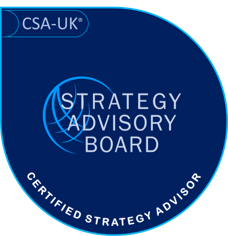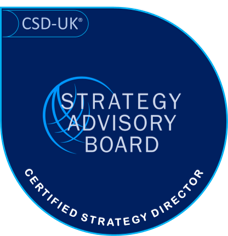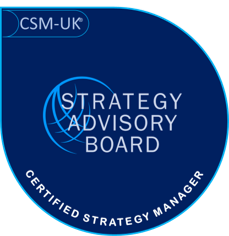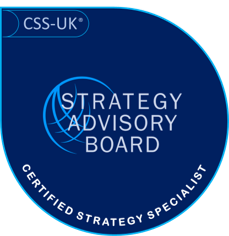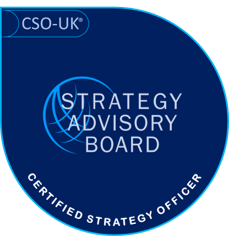Certified Tertiary Healthcare Strategist Specialized Professional Certification course is designed to equip healthcare professionals with advanced skills and knowledge necessary to lead and manage in the complex landscape of tertiary healthcare. This course delves into strategic management, patient care optimization, and organizational leadership within the highest levels of healthcare delivery. Participants will gain insights into cutting-edge practices, emerging technologies, and ethical considerations essential for effective decision-making in tertiary healthcare settings.
The qualified healthcare strategists with over 80% of marks in their final exams shall be also be rewarded with CHARTERED Strategist Professional Membership
WHAT IS CERTIFIED TERTIARY HEALTHCARE STRATEGIST “CTCS-UK” CERTIFICATION?
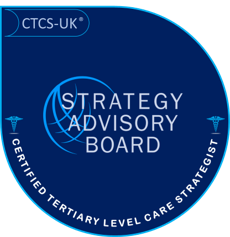
Our Certified Healthcare Management Strategists are EXPERTS, they create innovative hospital management strategies, new strategic opportunities and new futures to their organizations. CTCS’s are expected to find alternate strategic solutions for their healthcare organisations. CTCS’s always persuade and influence, create and innovate, and use structured thinking within their healthcare organization and evidence to solve strategic challenges & problems where there is no pre-defined methodology, focusing on the highest priority initiatives of the organization and its Shareholders / Stakeholders, they build relationships at all levels & deliver highest quality results at a pace a leading private sector organization would be proud of.
The Certified Tertiary Healthcare Strategists are Fully Capable of deploying effectively various strategic healthcare planning tools, are business shrewd with unique skills in problems analysis and solving. They are also strategic change agents as they disrupt the status quo with their new ideas and challenges.
Dear Strategy Learners please go through the Instructions carefully before starting with your Certification Program
Please Like, Subscribe & Follow STRATEGY TV Channel in which we shall be Introducing VIDEO CVs of our Certified Strategists that would surely boost their Professional Career within Strategic Management Career Framework.
Enrollment Instructions
STEP 1: You MUST Register / Signup SIGNUP FIRST
STEP 2: Then click at the Certified Tertiary Care Strategist add it in the cart & go through Payment Process (use Discount Coupon at the Checkout)
STEP 3: After the Payment Process your Enrollment would be Completed
STEP 4: Now is the Time to Deep-dive & Learn through Lessons, Appear & Pass Certification Exams (its mix of MCQs, T &Fs and Case Scenarios)
STEP 5: Go to Dashboard (Strategy Learners Profile) Click at Certificate
STEP 6: Copy the Link of your Digital Certificate that Validates your Qualification by your Employers
STEP 7: Scroll down the Certificate for Download through Small Arrow Button for Downloading
STEP 8: Share your Qualification on Twitter, Facebook, Linkedin & Instagram
STEP 9: Apply for Board Membership APPLY NOW
STEP 10: Start Receiving Strategy Management Assignments being Open to all Board Members.
STEP 11: Get Recognised as Practicing Strategist & Board Member Strategy Advisory Board
- Understand Tertiary Healthcare Concepts:
- Define and explain the principles and practices of tertiary healthcare.
- Differentiate between primary, secondary, tertiary, and quaternary care, emphasizing the role and significance of tertiary care in the healthcare continuum.
- Strategic Planning and Implementation:
- Develop strategic plans tailored to tertiary healthcare settings.
- Align tertiary healthcare services with broader healthcare system goals and community health needs.
- Healthcare Management and Operations:
- Manage day-to-day operations of tertiary healthcare facilities effectively.
- Optimize workflows, patient flow, and resource utilization to enhance efficiency and patient outcomes.
- Leadership and Decision-Making Skills:
- Demonstrate effective leadership skills in tertiary healthcare environments.
- Make informed, evidence-based decisions to improve patient care quality and organizational performance.
- Quality Improvement and Patient Safety:
- Design and implement quality improvement initiatives specific to tertiary healthcare.
- Ensure high standards of patient safety and care quality through continuous improvement efforts.
- Financial Management:
- Manage financial resources, including budgeting, cost control, and financial planning in tertiary healthcare environments.
- Address financial challenges unique to tertiary care settings, ensuring financial sustainability.
- Regulatory and Ethical Compliance:
- Navigate regulatory requirements and ethical considerations in tertiary healthcare management.
- Ensure compliance with healthcare laws and standards to maintain ethical practices.
- Healthcare Innovation and Technology Integration:
- Promote and manage the integration of innovative technologies in tertiary healthcare.
- Utilize health information systems and electronic health records (EHR) to improve care delivery and patient outcomes.
- Community Engagement and Public Health Initiatives:
- Engage with the community to understand and address local health needs in tertiary care settings.
- Implement public health initiatives and preventive care strategies to improve overall community health.
- Patient-Centered Care:
- Implement strategies to deliver patient-centered care in tertiary healthcare environments.
- Address patient needs and preferences to enhance satisfaction and treatment outcomes.
- Interdisciplinary Collaboration and Communication:
- Foster effective collaboration and communication among healthcare teams in tertiary care.
- Engage stakeholders, including patients, families, healthcare professionals, and policymakers.
- Human Resource Management:
- Recruit, train, and retain skilled healthcare professionals in tertiary care.
- Develop and implement professional development programs to enhance workforce skills and capabilities.
- Data Analytics and Decision Support:
- Utilize healthcare data analytics to support decision-making and improve operational efficiency.
- Implement decision support systems to enhance clinical and administrative decision-making in tertiary care.
- Supply Chain Management:
- Manage supply chains effectively to ensure timely availability of medical supplies and equipment in tertiary healthcare settings.
- Optimize procurement processes and inventory management to support healthcare delivery.
- Comprehensive Understanding of Tertiary Healthcare:
- Demonstrate a thorough understanding of tertiary healthcare principles, practices, and its role within the broader healthcare system.
- Explain the continuum of care from primary through quaternary levels, emphasizing the unique aspects and challenges of tertiary care.
- Strategic Planning and Implementation:
- Develop and implement strategic plans tailored to meet the specific needs and challenges of tertiary healthcare settings.
- Align tertiary healthcare services with organizational goals, healthcare system priorities, and community health needs.
- Effective Healthcare Management and Operations:
- Manage the operational complexities of tertiary healthcare facilities efficiently and effectively.
- Optimize resource allocation, patient flow, and operational workflows to enhance service delivery and patient outcomes.
- Leadership and Decision-Making Excellence:
- Exhibit strong leadership skills in tertiary healthcare environments, fostering a culture of collaboration and excellence.
- Make informed, evidence-based decisions to improve clinical outcomes, patient safety, and organizational performance.
- Continuous Quality Improvement and Patient Safety:
- Implement quality improvement initiatives that enhance patient care quality and safety within tertiary care settings.
- Monitor outcomes and adjust practices to ensure continuous improvement and adherence to best practices and standards.
- Financial Acumen and Sustainability:
- Manage financial resources effectively, including budgeting, cost control, and financial planning specific to tertiary healthcare operations.
- Address financial challenges and promote sustainability to support long-term organizational success.
- Regulatory Compliance and Ethical Practice:
- Navigate complex regulatory environments and ensure compliance with healthcare laws, regulations, and ethical standards.
- Uphold ethical practices in all aspects of tertiary healthcare management and decision-making.
- Innovation and Technology Integration:
- Lead the integration of innovative technologies and practices to enhance service delivery and patient care outcomes in tertiary healthcare.
- Utilize health information systems, electronic health records (EHR), and digital health solutions effectively.
- Community Engagement and Public Health Initiatives:
- Engage with the community to understand local health needs and collaborate on initiatives that improve health outcomes.
- Implement public health programs and preventive care strategies to promote community wellness and health equity.
- Patient-Centered Care Delivery:
- Implement strategies and practices that prioritize patient-centered care in tertiary healthcare settings.
- Ensure that patient preferences, values, and needs are central to care planning and delivery processes.
- Interdisciplinary Collaboration and Communication:
- Foster effective communication and collaboration among healthcare teams, interdisciplinary providers, and stakeholders.
- Enhance teamwork and coordination to optimize patient care and operational efficiencies in tertiary care environments.
- Human Resource Management and Development:
- Recruit, develop, and retain a skilled workforce capable of delivering high-quality care in tertiary healthcare.
- Implement strategies for staff training, development, and empowerment to enhance performance and job satisfaction.
- Data-Driven Decision-Making and Analytics:
- Utilize healthcare data analytics to inform strategic decisions, improve clinical outcomes, and optimize resource allocation.
- Implement data-driven solutions and decision support systems to enhance operational efficiency and effectiveness.
- Supply Chain Optimization:
- Manage supply chain logistics and procurement processes to ensure timely availability of essential medical supplies and equipment.
- Optimize inventory management and distribution to support uninterrupted healthcare delivery and patient care.
- Healthcare Executives and Administrators:
- Chief Executive Officers (CEOs) and Chief Operating Officers (COOs): Leaders responsible for overseeing tertiary healthcare facilities and operations.
- Hospital Administrators: Professionals managing day-to-day operations and strategic direction of tertiary care institutions.
- Clinical Leaders and Medical Directors:
- Medical Directors: Physicians and clinicians overseeing medical services and clinical departments in tertiary healthcare settings.
- Clinical Managers: Professionals managing clinical operations and ensuring quality patient care delivery.
- Quality Improvement and Patient Safety Officers:
- Directors of Quality Improvement: Experts in driving quality initiatives and enhancing patient safety measures within tertiary care.
- Patient Safety Officers: Professionals responsible for implementing and monitoring patient safety protocols.
- Financial Management and Operations:
- Chief Financial Officers (CFOs) and Finance Directors: Leaders managing financial strategies, budgeting, and financial operations specific to tertiary healthcare.
- Operations Managers: Professionals optimizing operational efficiencies and resource management in tertiary care facilities.
- Regulatory and Compliance Experts:
- Regulatory Affairs Directors: Professionals ensuring compliance with healthcare regulations and standards in tertiary care settings.
- Compliance Officers: Experts managing adherence to regulatory requirements and ethical practices.
- Healthcare Strategists and Planners:
- Healthcare Strategists: Individuals developing and executing strategic plans to align tertiary healthcare services with organizational goals and community health needs.
- Strategic Planning Managers: Professionals coordinating strategic initiatives and organizational planning in tertiary care.
- Health Information Technology (IT) Specialists:
- IT Directors: Leaders integrating and managing health information systems (HIS), electronic health records (EHR), and digital health technologies in tertiary healthcare.
- Healthcare Informatics Managers: Experts in leveraging data analytics and IT solutions to improve healthcare delivery and decision-making.
- Public Health and Community Engagement Specialists:
- Public Health Officers: Professionals collaborating with communities to address local health needs and implement public health programs in tertiary care.
- Community Health Advocates: Experts promoting health equity and community wellness through advocacy and outreach initiatives.
- Educators and Training Directors:
- Healthcare Educators: Professionals designing and delivering educational programs and training for staff in tertiary healthcare environments.
- Training and Development Managers: Leaders enhancing staff competencies and skills through continuous education and professional development.
- Consultants and Advisors:
- Healthcare Consultants: Experts providing strategic advice and consultancy services to improve operations and outcomes in tertiary care.
- Management Advisors: Professionals offering solutions to optimize management practices and organizational efficiency in tertiary healthcare.
- Research and Innovation Leaders:
- Directors of Research and Innovation: Professionals advancing clinical research, innovation, and evidence-based practices in tertiary healthcare settings.
- Health Services Researchers: Experts conducting studies to improve healthcare services, patient outcomes, and organizational performance.
- Healthcare Executive Roles:
- Chief Executive Officer (CEO) or Chief Operating Officer (COO): Overseeing the strategic direction and operations of tertiary healthcare institutions.
- Hospital Administrator: Managing day-to-day operations, financial health, and overall performance of tertiary care facilities.
- Clinical Leadership Positions:
- Medical Director: Leading clinical departments, setting clinical standards, and ensuring quality patient care in tertiary healthcare settings.
- Director of Specialty Services: Overseeing specialized medical services and enhancing clinical outcomes.
- Quality Improvement and Patient Safety:
- Director of Quality Improvement: Driving initiatives to enhance care quality, patient safety, and clinical outcomes in tertiary care.
- Patient Safety Officer: Monitoring and implementing protocols to improve patient safety and reduce medical errors.
- Financial Management and Operations:
- Chief Financial Officer (CFO) or Finance Director: Managing financial operations, budgeting, and financial strategy specific to tertiary healthcare.
- Operations Manager: Optimizing operational efficiencies, resource allocation, and workflow processes.
- Regulatory and Compliance Expertise:
- Regulatory Affairs Director: Ensuring compliance with healthcare regulations and standards relevant to tertiary care.
- Compliance Officer: Monitoring adherence to regulatory requirements and ethical practices in healthcare operations.
- Strategic Planning and Healthcare Consulting:
- Healthcare Strategist or Consultant: Providing strategic guidance and consultancy services to improve operational performance and patient outcomes in tertiary care.
- Strategic Planning Manager: Leading strategic initiatives and organizational planning aligned with healthcare system goals.
- Health Information Technology (IT) Leadership:
- IT Director or Health Informatics Manager: Overseeing the integration of health information systems (HIS), electronic health records (EHR), and digital health technologies in tertiary healthcare.
- Data Analyst or Decision Support Specialist: Utilizing healthcare data analytics to drive informed decision-making and improve operational efficiencies.
- Community and Public Health Initiatives:
- Public Health Director: Leading community health initiatives, addressing local health needs, and promoting health equity in tertiary care settings.
- Community Health Manager: Implementing public health programs and initiatives to enhance community wellness and preventive care.
- Education and Training Leadership:
- Healthcare Educator or Training Director: Designing and delivering educational programs, training, and professional development for staff in tertiary healthcare.
- Clinical Trainer: Providing specialized training to enhance clinical competencies and patient care delivery.
- Research and Innovation Roles:
- Director of Research and Innovation: Leading research efforts, fostering innovation, and advancing evidence-based practices in tertiary healthcare.
- Health Services Researcher: Conducting studies to evaluate healthcare services, patient outcomes, and healthcare delivery models.
- Policy Development and Advocacy:
- Healthcare Policy Advisor: Advising on healthcare policies, regulations, and advocacy initiatives impacting tertiary care.
- Health Advocate: Advocating for policies that improve access, quality, and equity in tertiary healthcare services.
- Human Resource Management:
- Director of Human Resources: Overseeing recruitment, retention, and development of healthcare professionals in tertiary care settings.
- Workforce Development Specialist: Enhancing staff competencies and skills through training and development programs.





